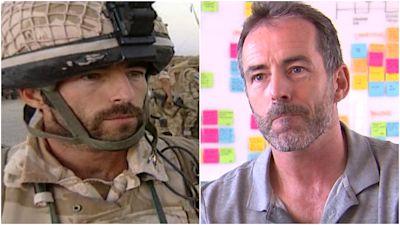'No, it wasn't worth it': British Army commander says Afghanistan war didn't justify their losses

In 2006, the soldiers of C Company, 3rd Battalion the Parachute Regiment, posed for a photo at their base in Sangin in Afghanistan's Helmand Province. At that time, Sangin was the most dangerous place on earth, the centre of British forces' fight against the Taliban. The Paras were sent to Helmand Province after the 2001 invasion of Afghanistan, a response to the September 11 terror attacks in the United States. The campaign lasted 20 years and cost the lives of 457 British soldiers. ITV News has tried to trace the people on the C Company photograph 15 years on to tell their stories, in our series Afghanistan: Photo From The Frontline.
The war in Afghanistan was “not worth it”, so says the commander of one of the most besieged British troops in the country.
Major Paul Blair was in charge of C Company 3 Para stationed in Sangin, Helmand Province, where his 127 men spent six months engaging the Taliban in some of the war’s most ferocious fighting.
Their mission was to purge the group’s influence in the south, while expanding that of the Kabul government.
And initially spirits were high, with Para 3 posing together for a group photo when they arrived in 2006, confident they could achieve their objectives.
But as the size of the task ahead became more apparent, that optimism soon evaporated – and a mission to win hearts and minds of the Afghan people turned into a fight for survival.
“Looking at the situation now, Helmand’s in Taliban control… the extent that we smashed up the countryside, blew up bridges, killed no end of insurgents,” he told ITV News.
“There was obvious collateral damage, I’m sure there were some non-combatants despite our best efforts killed or injured. So, no, it wasn’t worth it.”
'No, it wasn't worth it': Major Paul Blair reflects on the cost and toll of their service in Afghanistan
Britain is withdrawing its troops from the country after 20 years, following the US decision to pull out by September 11 this year.
Among the hundreds of British soldiers killed in that time, only one was a man under Major Blair’s command in Sangin.
Luke McCulloch was a popular young man in the company. Where he was on an attachment from the Royal Irish Regiment.
“Unusually, the Taliban had landed a mortar inside our compound and I just heard it flying over the top of us and landing,” he said.
“And as soon as I heard the cries of ‘medic’ I knew that something had happened.”
His death still haunts Major Blair.
'It could have been me, it could have been someone else': Commander Paul Blair says he still thinks about what he could have done differently to prevent Luke McCulloch's death
“Did I not correctly interpret the threats? Did I not take enough action? And I had to deal with that I spent a lot of years trying to deal with that.”
Asked if he has dealt with those feelings, he said: “Not entirely, I don’t think I ever will.”
The Paras had arrived in Afghanistan wearing soft caps and riving in open-top land rovers with the aim of setting the conditions for humanitarian and development work in one of the poorest parts of the world.
Major Blair recalled how they spent the first couple of months meetings the elders in the area. They delivered books to the school and tried to “improve the lives of the average Afghan”.
But within weeks they were fighting for their lives and it was only when they were finally flown out of Sangin that they got a chance to reflect on the past six months.
“I remember leaving Sangin on one of the helicopters flying out and I blubbed for five minutes,” Major Blair said.
“(I was) Looking out the window with the chinook gunner, trying to look reasonably sympathetic but at the same time trying to look cool and man this gun, but I had a little blub to myself and I was OK.
“But, interestingly, I had a look around the helicopter and there were a number of soldiers who were having a similar emotional response to just that release of pressure, having been under it for such a long period of time.”
Read more stories from our series Afghanistan: Photo From The Frontline